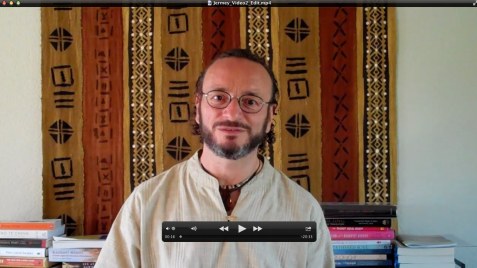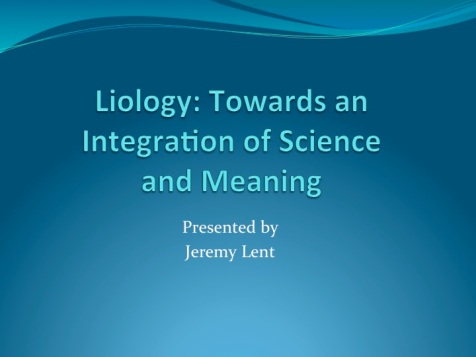What makes the idea of the li so radical for our society is that it’s both a spiritual and a scientific term. It offers us a bridge between the two domains of spirituality and science that have been so zealously off-limits to each other in our current cognitive framework. The li, as described in other posts, refers to the traditional Chinese Neo-Confucian term for the patterns of organization that link energy/matter (ch’i) together. These patterns are both fixed and dynamic. From a spiritual perspective, the Tao may be viewed as the universal set of manifestations of the infinite li: the infinite patterns by which nature organizes itself. From a scientific perspective, the li may be understood as the patterns of organization of complex systems studied in complexity science and in systems biology.
A recent study in the Proceedings of the National Academy of Sciences (PNAS) offers a wonderful example of a rigorous, scientific study of the li of shared arousal in humans. Of course, the authors don’t use the word “li.” Instead, they refer to the more mechanistic term “information,” which is about as close as modern science has yet come to an awareness of the li. In the study, the researches focused on a powerful fire-walking ritual conducted each year in a little village in Spain. Here’s how they describe the ritual:
After dancing for several minutes in a circle around the glowing bed of coals, the fire-walkers assemble and decide the order in which they will cross. They then take their place on the ground to wait their turns. The sound of a trumpet beckons each fire-walker to the walk, one by one. The fire-walk is conducted bare-footed, and most walkers carry another person on their backs while crossing the fire, typically a spouse, relative, or friend. Once they have crossed over, their closest friends or relatives rush over to hug and congratulate them.

Firewalkers in San Pedro Manrique synchronizing their heartbeats with related spectators
The researchers studied the heart rate of the fire-walkers as well as spectators. But they made a distinction between the spectators who were closely related to the fire-walkers, and those who were just there as tourists. What they found was that the heart rates of the closely-related spectators synchronized very closely with the fire-walkers, while those of the unrelated observers remained uncorrelated.
The researchers point out that there was no physical contact between the fire-walkers and their related spectators whose hearts rates peaked along with theirs. As they put it:
The synchrony of the physiological markers shared by the two beings cannot be due to direct exchange of matter or energy, leaving only the information available to spectators and participants as the basis of the coupling. Whether information is sufficiently salient to bring about coupling is determined by whether the spectator is related to at least one of the fire-walkers; hence, the coupling is socially modulated. The shared dynamics of heart rate are thus the consequence of socially modulated information-mediated coupling.
The key point is that there was no “direct exchange of matter or energy.” That is what, in traditional Chinese terms, is called ch’i. As the Neo-Confucianists explain it, the li is what connects the ch’i. In the case of the fire-walkers, the heat of the coal directly affected their own heart rates, but it was the sight of the fire-walkers, the sounds of them, and most crucially, the emotional connection with them in the hearts of the related spectators, that caused the spectators’ heart rates to synchronize with them. It was the li that synchronized the hearts of the spectators with those of the fire-walkers.
When you look a loved one in the eyes, it’s your shared li that connects you. And even within your own body, it’s your li that makes you who are. Your cells and their molecules come and go, but your li remains stable, changing dynamically as you mind/body organism develops, but always maintaining a connection with what you’ve been before and what you will become. After you die, your li will remain in the hearts of those who loved you. In fact, what we really are is not a bag of skin, flesh and bones. What we really are is a temporary collection of li, of a massively integrated series of self-organized patterns.
The li is the connectivity that binds us into an organism. It’s the connectivity that binds us to each other. Connectivity is the underlying principle of meaning in our lives. In fact, ultimately, the unconditional love that spiritual mystics describe is really an experience of the limitless connectivity of the li through which all things are related. This is the true meaning of the scientific research conducted on those fire-walkers and their spectators. But you won’t necessarily find these conclusions in the august pages of the PNAS.




